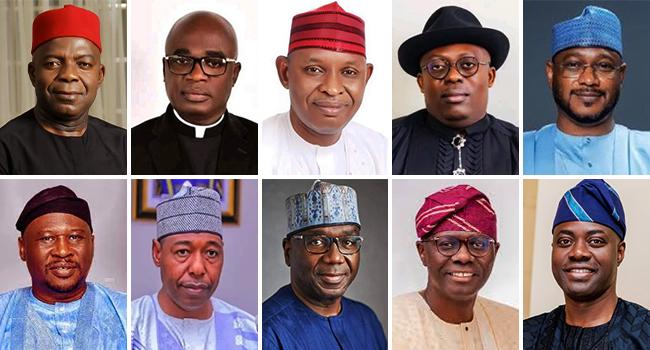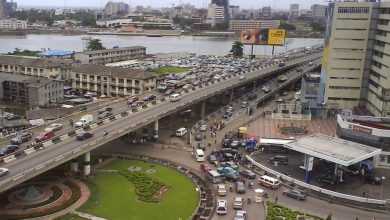
15 Highest Paid Governors in Nigeria
Read Also: 15 Highest-paid Male Actors by Movie
👉 Relocate to Canada Today!
Live, Study and Work in Canada. No Payment is Required! Hurry Now click here to Apply >> Immigrate to CanadaHighest Paid Governors in Nigeria are:
-
Nasir El-Rufai (Kaduna State):
Nasir El-Rufai, the Governor of Kaduna State, tops the list as one of the highest-paid governors in Nigeria. With his reputation for implementing bold reforms, he earns an estimated salary of ₦2,520,000 ($6,000) per month.
-
Nyesom Wike (Rivers State):
As the Governor of Rivers State, Nyesom Wike is renowned for his developmental strides in the region. His monthly salary stands at ₦2,480,000 ($5,900), making him one of the highest earners.
-
Aminu Tambuwal (Sokoto State):
Aminu Tambuwal, the Governor of Sokoto State, ranks high on the list. Known for his commitment to education and infrastructure development, he earns a monthly salary of ₦2,470,000 ($5,900).
-
Abdulaziz Yari (Zamfara State):
Abdulaziz Yari, the former Governor of Zamfara State, had a monthly salary of ₦2,430,000 ($5,800). During his tenure, he focused on agricultural reforms and security.Romantic Love Messages
Read Also: Top 15 Highest Paying Airline in Nigeria
-
Simon Lalong (Plateau State):
Simon Lalong, the Governor of Plateau State, earns an estimated ₦2,400,000 ($5,700) monthly. He has prioritized peace-building and economic diversification in his state.
-
Udom Emmanuel (Akwa Ibom State):
Governor Udom Emmanuel of Akwa Ibom State is recognized for his efforts in industrialization and infrastructure development. He receives a monthly salary of ₦2,390,000 ($5,700).Good Morning Love Message
-
Godwin Obaseki (Edo State):
Godwin Obaseki, the Governor of Edo State, has focused on economic reforms and job creation. His monthly salary stands at ₦2,380,000 ($5,700).
👉 Relocate to Canada Today!
Live, Study and Work in Canada. No Payment is Required! Hurry Now click here to Apply >> Immigrate to Canada-
Ifeanyi Okowa (Delta State):
Ifeanyi Okowa, the Governor of Delta State, is known for his commitment to healthcare and human capital development. His monthly salary is ₦2,370,000 ($5,600).
-
Dapo Abiodun (Ogun State):
Dapo Abiodun, the Governor of Ogun State, earns a monthly salary of ₦2,360,000 ($5,600). He has prioritized infrastructure, education, and agricultural development.Information Guide Nigeria
Read Also: 15 Highest Paid Female Actors by Movie
-
Willie Obiano (Anambra State):
Governor Willie Obiano of Anambra State is renowned for his efforts in security and agricultural development. He receives a monthly salary of ₦2,350,000 ($5,600).
-
Babajide Sanwo-Olu (Lagos State):
Babajide Sanwo-Olu, the Governor of Lagos State, earns an estimated ₦2,340,000 ($5,600) per month. He has focused on transportation, healthcare, and infrastructure development.
-
Adegboyega Oyetola (Osun State):
Adegboyega Oyetola, the Governor of Osun State, earns a monthly salary of ₦2,340,000 ($5,600). He has prioritized education, agriculture, and youth empowerment in his state.
-
Abdullahi Ganduje (Kano State):
Abdullahi Ganduje, the Governor of Kano State, receives a monthly salary of ₦2,330,000 ($5,500). Known for his focus on education, healthcare, and infrastructural development, he has played a crucial role in the state’s progress.
-
Seyi Makinde (Oyo State):
Seyi Makinde, the Governor of Oyo State, earns an estimated ₦2,320,000 ($5,500) per month. His administration has prioritized education, healthcare, and youth empowerment initiatives.
-
Benedict Ayade (Cross River State):
Benedict Ayade, the Governor of Cross River State, ranks among the highest-paid governors with a monthly salary of ₦2,310,000 ($5,500). He has made significant strides in tourism, infrastructure, and agriculture.
Read Also: 15 Highest Paying Teaching Jobs in Nigeria
He remuneration of public officials, including governors, has long been a topic of interest and debate in Nigeria. As citizens strive for transparency and accountability in governance, understanding the salaries and benefits received by ex-governors becomes crucial. This article aims to shed light on the salary structure of former governors in Nigeria, exploring the financial implications and implications for the country’s economy.
Governors’ Salary Structure: Prior to delving into the details, it is important to note that Nigeria operates a federal system of government, where each state has its own autonomy in determining the salaries and allowances of its public officials. Thus, the salary of an ex-governor can vary from state to state.NYSC Portal
Historically, the salary of governors in Nigeria has been a subject of public scrutiny due to its perceived extravagance. The Revenue Mobilization, Allocation, and Fiscal Commission (RMAFC), an independent body responsible for determining the salaries and allowances of public officials, sets guidelines for these earnings. According to the guidelines, the basic salary of a governor is fixed at 200% of the salary of a Minister in the Federal Republic of Nigeria.
Allowances and Benefits: In addition to the basic salary, ex-governors are entitled to several allowances and benefits. These include but are not limited to:
- Constituency allowance: This allowance is provided to facilitate the ex-governor’s connection with their constituency and cover expenses related to their representation.
- Accommodation: Former governors are entitled to furnished accommodation, typically a government-owned residence or a housing allowance.15 Most Popular News Blogs in Nigeria
- Vehicle and transportation: They receive official vehicles, including fuel and maintenance allowances, to facilitate their mobility within and outside the state.JAMB Portal
- Security: As prominent figures, ex-governors are entitled to personal security details to ensure their safety.
- Medical allowances: They receive medical coverage for themselves and their immediate family members.
- Domestic staff: Ex-governors are granted allowances to employ domestic staff such as cooks, drivers, and cleaners.Khephren Thuram sparks Liverpool move intrigue after Alexis Mac Allister transfer news
Criticism and Public Outrage: The salary and benefits enjoyed by ex-governors have generated significant controversy and public outrage in Nigeria. Critics argue that the salaries and allowances are excessive and contribute to the country’s financial burden, as funds that could be allocated to developmental projects are diverted to former public officials. Many citizens believe that the resources expended on ex-governors’ benefits could be better utilized to address pressing socio-economic challenges facing the nation.
Read Also: 15 Highest Paying Jobs in Nigeria
Calls for Reforms: In light of public discontent, there have been calls for the reduction of the salaries and benefits of ex-governors in Nigeria. Advocates argue that by trimming these expenses, funds could be redirected towards vital sectors such as education, healthcare, and infrastructure development.
Reforms have already taken place in some states, with a few governors voluntarily reducing their salaries and benefits. However, comprehensive changes at the national level are yet to be implemented.
Conclusion
These 15 governors, through their leadership and dedication, have not only earned their positions but also secured their place among the highest-paid governors in Nigeria. Their responsibilities include driving economic growth, implementing policies, promoting social development, and ensuring good governance within their respective states.
While their salaries are substantial, it is essential to recognize that these governors bear immense responsibilities and are expected to deliver tangible results for their constituents. Their earnings reflect the significance of their roles and the expectations placed upon them to improve the lives of the people they serve.
It is crucial for these governors to use their positions and resources effectively, addressing the various challenges faced by their states, including infrastructure deficiencies, unemployment, education gaps, healthcare disparities, and security concerns. By implementing strategic policies, fostering economic development, and prioritizing the welfare of their citizens, these governors have the potential to create lasting positive impacts and drive progress in Nigeria.
Check JAMB RESULT
Check and Confirm: How much is Dollar to Naira







